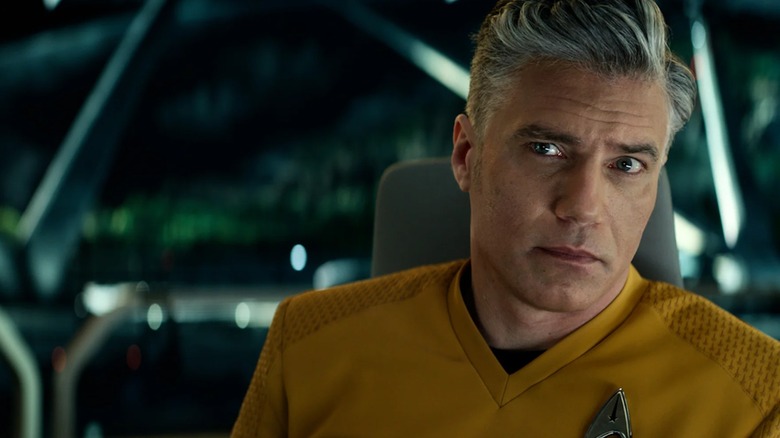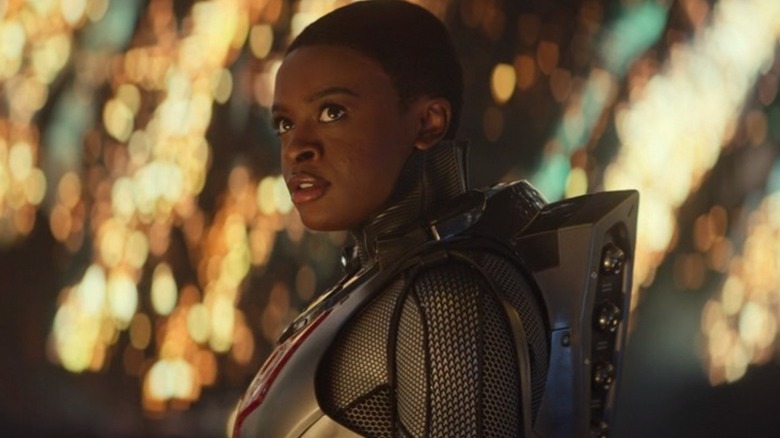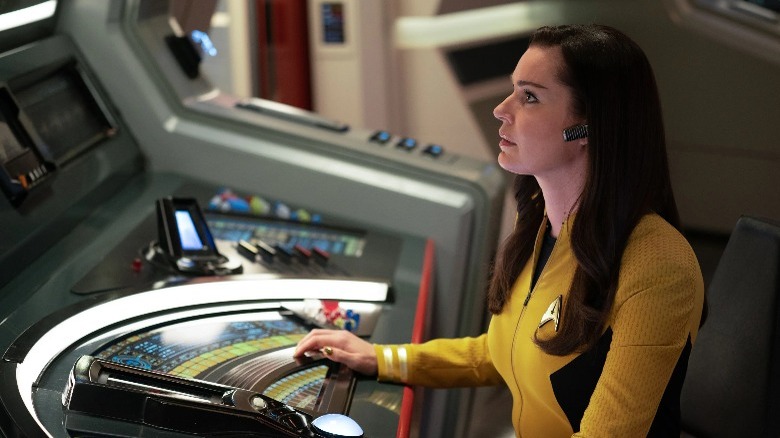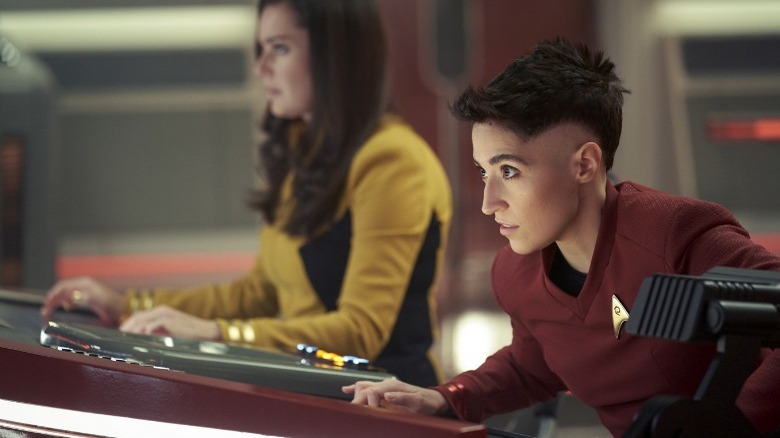Gosh Darn It, Star Trek: Strange New Worlds Is One Optimistic Show
In the three weeks since it debuted, "Star Trek: Strange New Worlds" has pulled out all the stops to win over Trek fans who may have been hesitant about the prospect of an original series prequel. The show is bright and fun, with a welcome return to episodic adventures and a winning ensemble cast. It also has something that, more than any other element, makes it feel like the "Star Trek" Gene Roddenberry envisioned over a half-century ago: hope.
"Star Trek: Strange New Worlds" is a relentlessly optimistic show that's launching during what feels like one of the darkest periods in many of our lifetimes. While our version of Earth faces crises and disasters of all kinds, the new show offers a glimpse into a future in which the world's best and brightest have endured the worst of the worst and still emerged with their ability to hope intact.
The show centers awe at every opportunity
Nearly all of the show's best moments to date carry a torch of bright-burning optimism. Captain Pike (Anson Mount) convinces a planet not to go to war with a simple plea from his heart. Dr. M'Benga (Babs Olusanmokun) keeps hope for his daughter's future alive aboard a ship where anything seems possible. And in a plot that should by all accounts be cheesy yet is somehow delightful and triumphant instead, Cadet Uhura (Celia Rose Gooding) saves the Enterprise crews' hides through the power of song. The power of song!
"Star Trek: Strange New Worlds" doesn't just smother hope all over its main plots: it infuses it into the very fabric of the show. Some of the loveliest moments we've seen so far involve a simple sort of awe, the kind that can barely be described in words. It's the awe of standing on a comet after dreaming of going to the stars. It's the awe of the feel of rain on your skin after a lifetime of drought. It's the awe of straight-laced Spock (Ethan Peck), surprising everyone by learning to laugh when things go wrong.
In a featurette titled "Inside the Series" released by Paramount+ ahead of the show's premiere, the cast and crew spoke about the optimism of "Star Trek: Strange New Worlds." Co-creator Akiva Goldsman explained that the new series is designed around "the experience of commonality and of adventure and of joy, because ultimately 'Star Trek' is at its heart optimistic and foot-forward when it comes to the future." It's true that Roddenberry's vision for the series has always been one of spirited optimism, compassion, and level-headed cooperation. "Star Trek" has tackled issues of bigotry, warmongering, inequity, and disease from the very start, but it's almost always imagined that the right team of brave, inquisitive people could come up with a solution for any crisis.
Here, hope is an action
Of course, it's a lot harder to hope than it used to be. When Roddenberry envisioned planets fraught with division, hatred, and the threat of nuclear war, the show's future was a stand-in for his present. Now, generations later, it's painful to see that the original Enterprise crew's simple mission to promote peace and understanding is as necessary – and as much of an uphill battle – as ever. When Captain Kirk (William Shatner) told Spock (Leonard Nimoy) that one man can change the present, as he did in the famous episode "Mirror, Mirror," that may have been inspiring enough for 1967. But it feels pat and oversimplified today, small in the face of seemingly insurmountable problems.
Luckily, "Star Trek: Strange New Worlds" seems to be plotting a specific course for its optimism, one that seems to appreciate the complexities of maintaining hope in a world as messed up as the one modern viewers are tuning in from. The show's mission statement becomes clearer than ever in its third episode. The crew of the Enterprise has already become fast friends at this point, bonded by their commitment to the Prime Directive. Yet even with their guiding principle already outlined, "Star Trek: Strange New Worlds" seems intent on reminding us that sometimes it's okay to break the rules for a better future.
Members of the crew forgive one another's failure to adhere to Starfleet codes of conduct not once or twice this latest episode, but four times. Nurse Chapel (Jess Bush) ignores archaic guidelines about inter-species blood donation to let Number One (Rebecca Romijn) help the sick crew members. Number One lets La'an (Christina Chong) off the hook for hitting her. Pike refuses Number One's attempt to resign after failing to disclose her Illyrian status. And Number One, in turn, looks the other way while Doctor M'Benga attempts to help his sick daughter.
Trek embraces optimism against the odds
On a personal level, these acts are calls for compassion and empathy. On an interpersonal level, taken together, they're also a call to action in the face of institutional injustice. The Enterprise crew chooses to ignore Starfleet protocols that would persecute the marginalized and sick among them and does so without giving the matter so much as a second thought. It's the sort of empowered civil disobedience that calls to mind the words of Martin Luther King Jr, who wrote in his Letter From Birmingham Jail (just a few years before Roddenberry's series took flight) that "one has a moral responsibility to disobey unjust laws." This new crew, like all the best "Star Trek" crews, doesn't seem to see the point in optimism without action.
Optimism is easier said than done, if only for the simple fact that every good thing ends eventually. "Star Trek: Strange New Worlds" knows this too. It may be glass-half-full science fiction, but it's not a fantasy. This is mortality, the heaviest weight that presses down on so many of us as we try to figure out how to keep hope. Yet it seems that this show is ready to deal with that, too.
As cheery as it is, the entire series is built on a doomed foundation. Captain Pike saw his death foretold before the series even began, and he's haunted by the knowledge that his days are numbered even as he guides the crew each day. "How does a person ... play that game of life when the outcome is already determined?" Mount asks in the behind-the-scenes featurette. It's a deep, vital question, and it's one the show hasn't answered yet. But I imagine the answer will look a lot like the way Pike is already playing the game of life, which is yet another lesson "Star Trek: Strange New Worlds" seems ready to teach us if we let it.
That is, of course, with hope against all odds.



